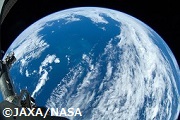| タイトル | Global Warming Estimation from MSU: Correction for Drift and Calibration Errors |
| 著者(英) | Yoo, J.-M.; Iacovazzi, R., Jr.; Prabhakara, C. |
| 著者所属(英) | NASA Goddard Space Flight Center |
| 発行日 | 2000-01-01 |
| 言語 | eng |
| 内容記述 | Microwave Sounding Unit (MSU) radiometer observations in Ch 2 (53.74 GHz), made in the nadir direction from sequential, sun-synchronous, polar-orbiting NOAA morning satellites (NOAA 6, 10 and 12 that have approximately 7am/7pm orbital geometry) and. afternoon satellites (NOAA 7, 9, 11 and 14 that have approximately 2am/2pm orbital geometry) are analyzed in this study to derive global temperature trend from 1980 to 1998. In order to remove the discontinuities between the data of the successive satellites and to get a continuous time series, first we have used shortest possible time record of each satellite. In this way we get a preliminary estimate of the global temperature trend of 0.21 K/decade. However, this estimate is affected by systematic time-dependent errors. One such error is the instrument calibration error eo. This error can be inferred whenever there are overlapping measurements made by two satellites over an extended period of time. From the available successive satellite data we have taken the longest possible time record of each satellite to form the time series during the period 1980 to 1998 to this error eo. We find eo can decrease the global temperature trend by approximately 0.07 K/decade. In addition there are systematic time dependent errors ed and ec present in the data that are introduced by the drift in the satellite orbital geometry. ed arises from the diurnal cycle in temperature and ec is the drift related change in the calibration of the MSU. In order to analyze the nature of these drift related errors the multi-satellite Ch 2 data set is partitioned into am and pm subsets to create two independent time series. The error ed can be assessed in the am and pm data of Ch 2 on land and can be eliminated. Observation made in the MSU Ch 1 (50.3 GHz) support this approach. The error ec is obvious only in the difference between the pm and am observations of Ch 2 over the ocean. We have followed two different paths to assess the impact of the error ec on the global temperature trend. In one path the entire error ec is placed in the am data while in the other it is placed in the pm data. Global temperature trend is increased or decreased by approximately 0.03 K/decade depending upon this placement. Taking into account all random errors and systematic errors our analysis of MSU observations leads us to conclude that a conservative estimate of the global warming is 0. 11 (+/-) 0.04 K/decade during 1980 to 1998. |
| NASA分類 | Environment Pollution |
| 権利 | No Copyright |
|

